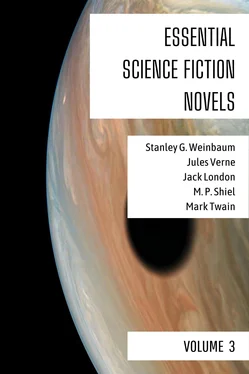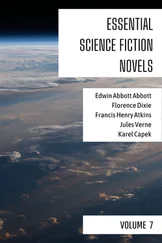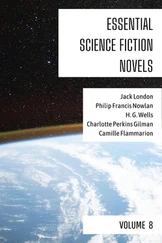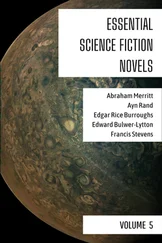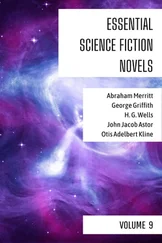Frank R. Stockton gives another supernatural scientific glimpse into the future, showing as impossibilities certain things that have since come to pass, while some of the changes prophesied as imminent are yet unrealized and apparently far from actualities. Jack London’s Scarlet Plague pictures the earth returned to barbarism, since most of the inhabitants have been swept away by a scourge and the others have failed to carry on the torch of civilization. H. G. Wells gives account of a tour into futurity, wherein the miracles of modern science work revolutions in human life, and he satirizes society, showing a topsy-turvy state of affairs in A.D. 2100. His Dream of Armageddon is a story of futurity wherein a man has continuous visions of what his experiences will be in another life far in the future. That life becomes more real to him than his actual existence, and he grows indifferent to events taking place around him while rent with emotion over the griefs to come in another age. Of course, Edward Bellamy’s Looking Backward , with its social and mechanistic miracles that now seem flat and tame to us, might be said to be the father of most of these modern prophecies of scientific futurity. Samuel Butler’s Erewhon contains many elements of impossibility in relation to life, and is a satire on society, though perhaps not, strictly speaking, supernatural. These prophecies of the time to come are in the main intended as social satires, as symbolic analyses of the weaknesses of present life. They evince vivid imagination and much ingenuity in contriving the mechanisms that are to transform life, yet they are not examples of great fiction. Mark Twain reverses the type in his Connecticut Yankee at King Arthur’s Court , for he shows a man of the present taking part in the life of the far past, managing to parody both mediævalism and the Yankee character at once. H. G. Wells is particularly interested in studying the unused forces of the world and fancying what would happen under other conditions. His play of scientific speculation has produced many stories that he does not greatly value now himself, but which are of interest as showing certain tendencies of fiction.
Views of other planets form a feature of modern supernaturalism, for the writer now sets his stories not only on earth, in heaven, and in hell but on other worlds besides. The astrologer of ancient fiction, with his eye fixed ever on the stars, seeking to discern their influence on human destiny, appears no more among us. He has been replaced by the astronomer who scans the stars yet with a different purpose in fiction. He wishes to find out the life of citizens of other planets rather than to figure out the fate of mortals on the earth. Many stories of modern times cause new planets to swim into our literary ken and describe their citizens with ease. H. G. Wells stars here as elsewhere. In his War of the Worlds he depicts a struggle between the earth people and the Martians, in which many supernatural elements enter. The people of Mars are a repulsive horde of creatures, yet they have wonderful organization and command of resources, and they conquer the earth to prey upon it. This book has suffered the inevitable parody. In The Crystal Egg , Wells describes a curious globe in which the gazer can see scenes reflected from Mars. The author suggests two theories as to the possibility of this,—either that the crystal is in both worlds at once, remaining stationary in one and moving in the other, and that it reflects scenes in Mars so that they are visible on earth, or else that by a peculiar sympathy with a companion globe on the other planet it shows on its surface what happens in the other world. It is hinted that the Martians have sent the crystal to the earth in order that they might catch glimpses of our life.
In The Star , Wells gives yet another story of the future, of other planetary influences. By the passing of a strange star, life on earth is convulsed and conditions radically changed. These conditions are observed by the astronomers on Mars, who are beings different from men, yet very intelligent. They draw conclusions as to the amount of damage done to the earth, satirizing human theories as to Mars. The Days of the Comet shows earthly life changed by the passing of a comet, but instead of the destruction described in the other story, the social conditions are vastly improved and a millennium is ushered in. Wells makes a voyage to the moon possible by the discovery of a substance which resists gravity. Other instances might be given, for there has been no lack of lunar literature, but they are not usually worth much.
Du Maurier’s The Martian , which combines the elements of metempsychosis, automatic writing, and dream-supernaturalism, with the idea of ghostly astronomy, tells of a supernatural visitant from Mars. The Martian is a young woman whose spirit comes to inhabit a young man to whom she dictates wonderful books in his dreams. She writes letters to him in a sort of private code, in which she tells of her previous incarnations on Mars, of the Martians who are extraordinary amphibious beings, descended from a small sea animal. They have unusual acuteness of senses with an added sixth sense, a sort of orientation, a feeling of a magnetic current, which she imparts to her protégé, Barty Joscelyn. Jack London tells a story of interplanetary metempsychosis, where the central character, a prisoner in San Quentin, finds himself able to will his body to die at times, thus releasing his spirit to fly through space and relive its experiences in previous incarnations.
Barry Pain’s The Celestial Grocery is a phantasy of insanity and the supernatural, with its setting on two planets. It contains a cab horse that talks and laughs, and other inversions of the natural. A man is taken on a journey to another world, sees the stars and the earth in space beneath him, and finds everything different from what he has known before. People there have two bodies and send them alternately to the wash, though they seldom wear them. The celestial shop sells nothing concrete, only abstractions, emotions, experiences. One may buy measures of love, requited or unselfishly hopeless, of political success, of literary fame, or of power or what-not. Happiness is a blend, however, for which one must mix the ingredients for himself. The story is symbolic of the ideals of earth, with a sad, effective satire. The end is insanity, leaving one wondering how much of it is pure phantasy of a mad man’s brain or how much actuality. It is reminiscent of Hawthorne’s Intelligence Office with its symbolic supernaturalism.
Hypnotism enters largely into the fiction of modern times. Hypnotism may or may not be considered as supernatural, yet it borders so closely on to the realm of the uncanny, and is so related to science of to-day as well as to the sorcery of the past, that it should be considered in this connection for it carries on the traditions of the supernatural. In its earlier stages hypnotism was considered as distinctly diabolic, used only for unlawful purposes, being associated with witchcraft. It is only in more recent times that it has been rehabilitated in the public mind and thought of as a science which may be used for helpful ends. It is so mysterious in its power that it affords complications in plenty for the novelist and has been utilized in various ways. In some cases, as F. Marion Crawford’s The Witch of Prague , it is associated still with evil power and held as a black art. Unorna has an unearthly power gained through hypnotism which is more than hypnotic, and which she uses to further her own ends. Strange scientific ideas of life and of death are seen here, and someone says of her: “You would make a living mummy of a man. I should expect to find him with his head cut off and living by means of a glass heart and thinking through a rabbit’s brain.” She embalms an old man in a continuous hypnotic lethargy, recalling him only at intervals to do mechanically the things necessary to prolong life. She is trying to see if she can cause human tissue to live forever in this embalmed state, hoping to learn through it the secret of eternal life. This, of course, suggests Poe’s stories of the subject, Mesmeric Revelations and The Facts in the Case of M. Waldemar . The latter is one of the most revolting instances of scientific supernaturalism, for the dying man is mesmerized in the moment of death and remains in that condition, dead, yet undecaying, and speaking, repeating with his horrible tongue the statement, “I am dead.” After seven months, further experiments break the spell, and he, pleading to be allowed to be at peace in death, falls suddenly away into a loathsome, liquid putrescence before the eyes of the experimenters.
Читать дальше
